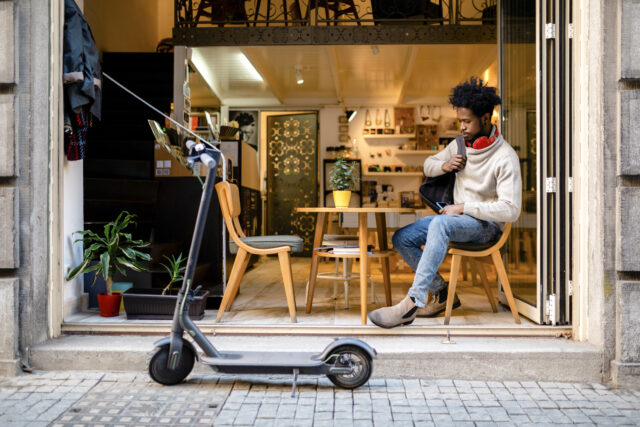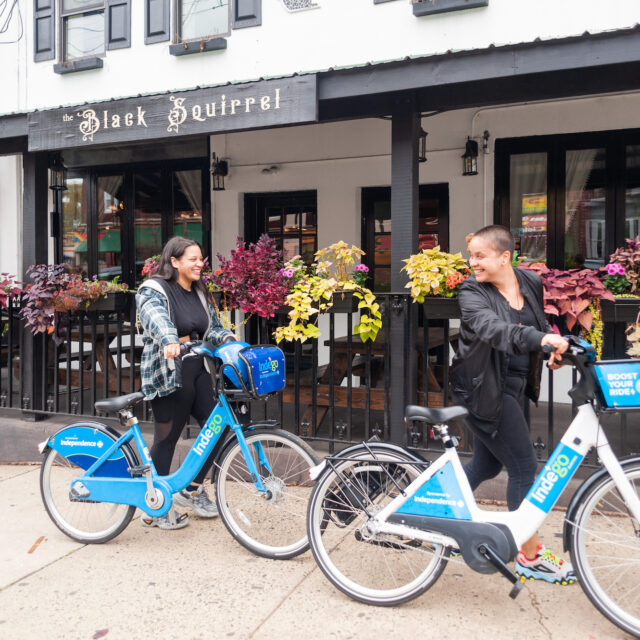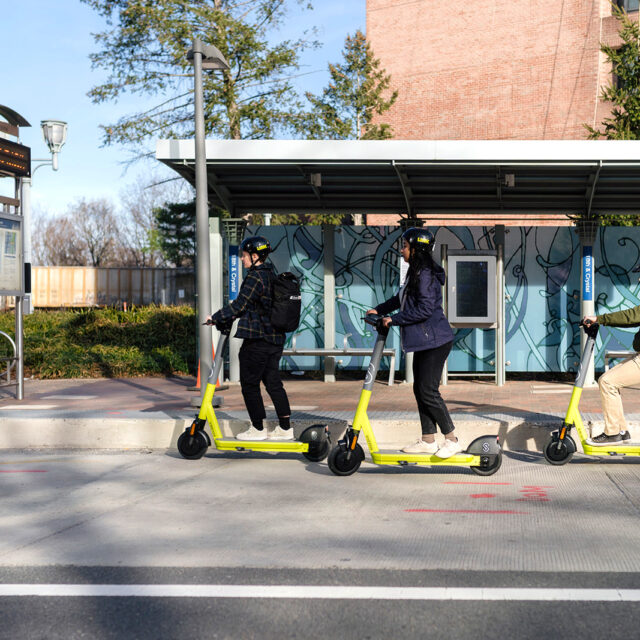Wheels to Meals
by Kiran Herbert, Communications Manager
June 29, 2022
According to new research, the introduction of e-scooters in a city significantly impacts restaurant spending.

E-scooters can get a bad rap, thanks largely to improper use on the part of a few customers, who might obstruct sidewalks with reckless riding or improper parking. In fact, just this month, St. Louis, Missouri, banned electric scooters downtown in a push to prevent crime — despite dubious evidence that they are the root cause of any issues. Unfortunately, the negative press e-scooters often garner overshadows the undeniable benefits they offer in terms of expanding mobility options for people in cities the world over. A new study from researchers at Emory University, however, positions them in a different light.
In “Wheels to Meals: Measuring the Impact of Micromobility on Restaurant Demand,” marketing researchers Kyeongbin Kim and Daniel McCarthy found that the introduction of e-scooters in a city significantly impacts the amount of money spent at restaurants, increasing a person’s expenses by about 4.4%. Noting how dockless shared micromobility services have grown substantially in the last five years, Kim and McCarthy decided to investigate their impact on consumer demand. By focusing on e-scooters — the fastest-growing segment of the market — the authors were able to determine the way the industry influences spending in one of the largest segments of the economy: the restaurant industry.
To gauge the influence of e-scooters on restaurant spending, Kim and McCarthy used 2018 data covering 391 companies in a total of 98 U.S. cities. While the impact varied depending on the restaurant subcategory — for example, fast-food restaurants performed the best while sitdown restaurant spending was insignificant — the total incremental spending was at least $10.2 million annually across all cities that first allowed e-scooters to operate over the summer of 2018.
The study also notes that e-scooters can help facilitate the discovery of new restaurants for prospective customers and repeat business from already-acquired customers. Importantly, the researchers found that the e-scooters had an insignificant impact on non-restaurant instore spending, meaning that the positive effects observed in the restaurant industry aren’t offset by negative effects on other local businesses. The research also found that in addition to frequenting restaurants, folks were primarily using e-scooters to get to transit, commute to work or school, and/or run essential errands.
The “Wheels to Meals” research goes hand in hand with a 2020 study out of Portland State University, which found that bike lanes can benefit local businesses, contribute to positive economic development, boost retail sales, and even encourage tourism. By focusing on 14 streets in six U.S. cities with a heavy presence of food service and retail businesses, investigators Jenny Liu and Jennifer Dill found that most businesses benefited overall — seeing growth in employment and sales, specifically — from bike lanes being installed on their respective streets. In a more recent study from 2022, Dill and others looked at twelve active transportation projects constructed in the greater Portland region between 2001 and 2016 and found that 75% of the project locations saw measurable economic gains in the food or retail industries after implementation.
As many cities debate doing away with slow streets and e-scooters completely, these sorts of studies point to the obvious advantages of more people having access to mobility in our urban environments. When people can more easily get around, they’re able to access essential services and spend money locally. Many companies also offer pricing schemes that make e-scooters affordable to low-income earners, an overall win for creating more equitable access.
In early June, the New York Times ran an article titled “Scooters Get a Second Chance,” noting that despite having their share of haters, e-scooters are both constantly improving and enduring. Companies have worked to better e-scooter technology while cities continue to regulate operations — the result is an industry that has managed to “minimize the downsides and maximize the public good.”
As shared micromobility continues to evolve, more research is needed to speak to the ways it betters our individual lives and society as a whole. However, if you’re one of the many people that already use it to grab dinner, make a doctor’s appointment, or catch a bus, the proof is in the pudding.
The Better Bike Share Partnership is funded by The JPB Foundation as a collaboration between the City of Philadelphia, the National Association of City Transportation Officials (NACTO) and the PeopleForBikes Foundation to build equitable and replicable bike share systems. Follow us on Facebook, Twitter and Instagram or sign up for our weekly newsletter. Got a question or a story idea? Email kiran@peopleforbikes.org.



